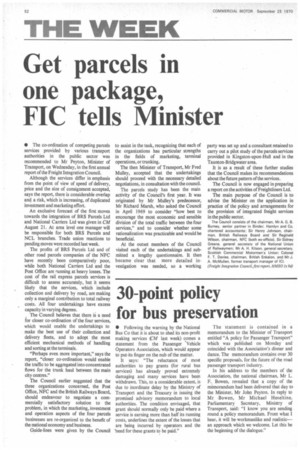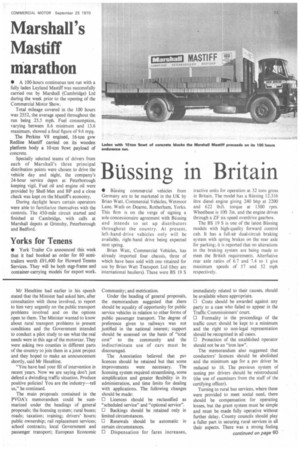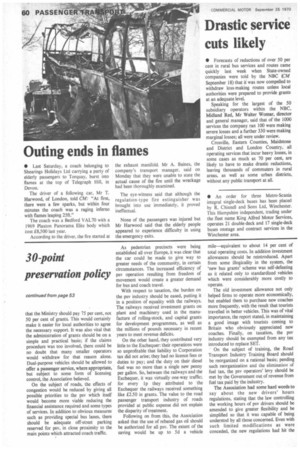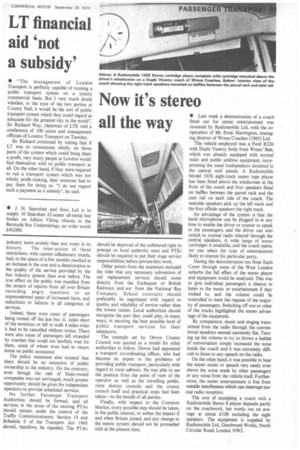30-point policy for bus preservation
Page 54

Page 55

Page 62

Page 63

If you've noticed an error in this article please click here to report it so we can fix it.
• Following the warning by the National Bus Co that it is about to shed its non-profit making services (CM last week) comes a statement from the Passenger Vehicle Operators Association, which would appear to put-its finger on the nub of the matter.
It says: "The reluctance of most authorities to pay grants (for rural bus services) has already proved extremely damaging and many services have been withdrawn. This, to a considerable extent, is due to inordinate delay by the Ministry of Transport and the Treasury in issuing the promised advisory memorandum to local authorities. The condition envisaged, that grant should normally only be paid where a service is earning more than half its running costs, underlines the extent of the losses that are being incurred by operators and the heed for these grants to be paid." The statement is contained in a memorandum to the Minister of Transport entitled "A policy for Passenger Transport" which was published on Monday and coincided with the Association's dinner and dance. The memorandum contains over 30 specific proposals, for the future of the road passenger transport industry.
In his address to the members of the Association, the national chairman, Mr L. F. Bowen, revealed that a copy of the memorandum had been delivered that day to the Minister, Mr John Peyton. In reply to Mr .Bowen, Mr Michael Heseltine, Parliamentary Secretary, Ministry of Transport, said: "I know you are sending round a policy memorandum. From what I hear, it will be ,workmanlike and realistic— an approach which we welcome. Let this be the beginning of the dialogue."
Mr Hese!tine had earlier in his speech stated that the Minister had asked him, after consultation with those involved, to report to him very urgently on the public transport problems involved and on the options open to them. The Minister wanted to know about rural transport problems in present conditions and the Government intended to conduct a pilot study to see what the real needs were in this age of the motorcar. They were asking two counties in different parts of the country to join them in a joint project and they hoped to make an announcement shortly, said Mr Hese'tine.
"You have had your fill of intervention in recent years. Now we are saying don't just defend a dwindling traffic situation. Produce positive policies! You are the industry—tell us," he continued.
The main proposals contained in the PV0A's memorandum could be summarized under the headings of general proposals; the licensing system; rural buses; roads; taxation; training; drivers' hours; public ownership; rail replacement services; school contracts; local Government and passenger transport; European Economic Community; and metrication.
Under the heading of general proposals, the memorandum suggested that „there should be equality of opportunity for public service vehicles in relation to other forms of public passenger transport. The degree of preference given to railways was not justified in the national interest; support should be assessed on the basis of "total cost" to the community and the indiscriminate use of cars must be discouraged.
The Association believed that psv licences should be retained but that some improvements were necessary. The licensing system required streamlining, some simplification and greater flexibility in its administration, and time limits for dealing with applications. The following changes should be made: O Licences should be reclassified as "scheduled service" and "optional service". 1: Backings should be retained only in limited circumstances.
O Renewals should be automatic in certain circumstances.
O Dispensation for fares increases, immediately related to their causes, should be available where appropriate.
El Costs should be awarded against any party to a case who failed to appear in the Traffic Commissioners' court.
O Formality in the proceedings of the traffic court should be kept to a minimum and the right to non-legal representation should be recognised in all cases.
O Protection of the established operator should not be an "iron law".
The memorandum also suggested that conductors' licences should be abolished and the minimum age for a psv driver be reduced to 18. The previous system of testing psv drivers should be reintroduced (the use of examiners from the staff of the certifying officer).
Turning to rural bus services, where these were provided to meet social need, there should be compensation for operating losses, but the grant system must be simple and must be made fully operative without further delay. County councils should play a fuller part in securing rural services in all their aspects. There was a strong feeling that the Ministry should pay 75 per cent, not 50 per cent of grants. This would certainly make it easier for local authorities to agree the necessary support. It was also vital that the administration of grants should be on a simple and practical basis; if the claims procedure was too involved, there could be no doubt that many smaller operators would withdraw for that reason alone. Dual-purpose vehicles should be allowed to offer a passenger service, where appropriate, but subject to some form of licensing control, the Association believed.
On the subject of roads, the effects of congestion would be reduced by giving all possible priorities to the psv which itself would become more viable reducing the financial assistance required and some types of services. In addition to obvious measures such as providing special bus lanes, there should be adequate off-street parking reserved for psv, in close proximity to the main points which attracted coach traffic. As pedestrian precincts were being established all over Europe, it was clear that the car could be made to give way to greater needs of the community, in certain circumstances. The increased efficiency of psv operation resulting from freedom of movement would create a greater demand for bus and coach travel.
With respect to taxation, the burden on the psv industry should be eased, putting it in a position of equality with the railways. The railways received investment grants on plant and machinery used in the manufacture of rolling-stock, and capital grants for development programmes, as well as the millions of pounds necessary in recent years to meet revenue deficits.
On the other hand, they contributed very little to the Exchequer: their operations were so unprofitable that liability to Corporation tax did not arise; they had no licence fees or duties to pay; and the duty on their diesel fuel was no more than a single new penny per gallon. So, between the railways and the Exchequer, it was virtually one-way traffic; for every lp they attributed to the Exchequer the railways received something like £2.50 in grants. The value to the road passenger transport industry of roads provided at public expense did not explain the disparity of treatment.
Following on from this, the Association asked that the use of rebated gas oil should be authorized for all psv. The extent of the saving would be up to 5d a vehicle mile—equivalent to about 14 per cent of total operating costs. In addition investment allowances should be reintroduced. Apart from some illogicality in the system, the 'new bus grants' scheme was self-defeating as it related only to standardized vehicles which were considerably more costly to operate.
The old investment allowance not only helped firms to operate more economically, but enabled them to purchase new coaches more frequently, with the result that tourists travelled in better vehicles. This was of vital importance, the report stated, in maintaining a good image with tourists coming to Britain who obviously appreciated new coaches. Finally, on taxation, the psv industry should be exempted from any tax introduced to replace SET.
On the subject of training, the Road Transport Industry Training Board should be reorganized on a rational basis; pending such reorganization and the elimination of fuel tax, the psv operators' levy should be met by the Government out of revenue from fuel tax paid by the industry.
The Association had some hard words to say about the new drivers' hours regulations, stating that the law controlling the working hours of psv drivers should be amended to give greater flexibility and be simplified so that it was capable of being understod by all those concerned. Even with such limited modifications as were conceded, the new regulations had hit the industry more acutely than any event in its history. The inter-action of these restrictions, with current inflationary trends, had, in the space of a few months resulted in an increase in the cost and a deterioration in the quality of the service provided by the bus industry greater than ever before. The true effect on the public was manifest from the stream of reports from all over Britain recording angry reactions to an unprecedented spate of increased fares, and reductions or failures in all categories of services.
Indeed, there were cases of passengers being turned off the last bus 14 miles short of the terminus, or left to walk 4 miles when it had to be cancelled without notice. There were also cases of passengers left stranded by coaches that could not lawfully wait for them, some or whom even had to return home on public assistance.
The policy statement also insisted that there should be no extension of public ownership in the industry. On the contrary, even though the sale of State-owned companies was not envisaged, much greater opportunity should be given for independent operators to provide scheduled services.
No further Passenger Transport Authorities should be formed, and all services in the areas of the existing PTAs should remain under the control of the Traffic Commississioners. Section 19 and Schedule 6 of the Transport Act 1968 should, therefore, be repealed. The PTAs should be deprived of the unfettered Tight to precept on local authority rates and PTEs should be required to put their stage service responsibilities before private-hire work.
Other points from the statement included the rider that any necessary subvention of rail replacement services should come directly from the Exchequer or British Railways and not from the National Bus Company. School contracts should preferably be negotiated with regard to quality and reliability of service rather than the lowest tender. Local authorities should recognize the part they could play, in many ways, in securing the best possible level of public transport services for their ratepayers.
The example set by Devon County Council was quoted as amodel for other authorities to follow. Devon had appointed a transport co-ordinating officer, who had become an expert in the problems of providing public transport, particularly with regard to rural seivices. He was able to see the position from the point of view of the operator as well as the travelling public, rural district councils and the county council itself and practical steps had been taken—to the benefit of all parties.
Finally, with respect to the Common Market, every possible step should be taken, in the public interest, to soften the impact if and when Britain joined, and any change to the metric system should not be proceeded with at the present time.


























































































































































































